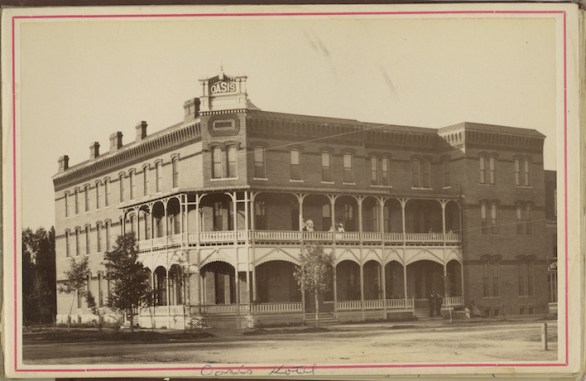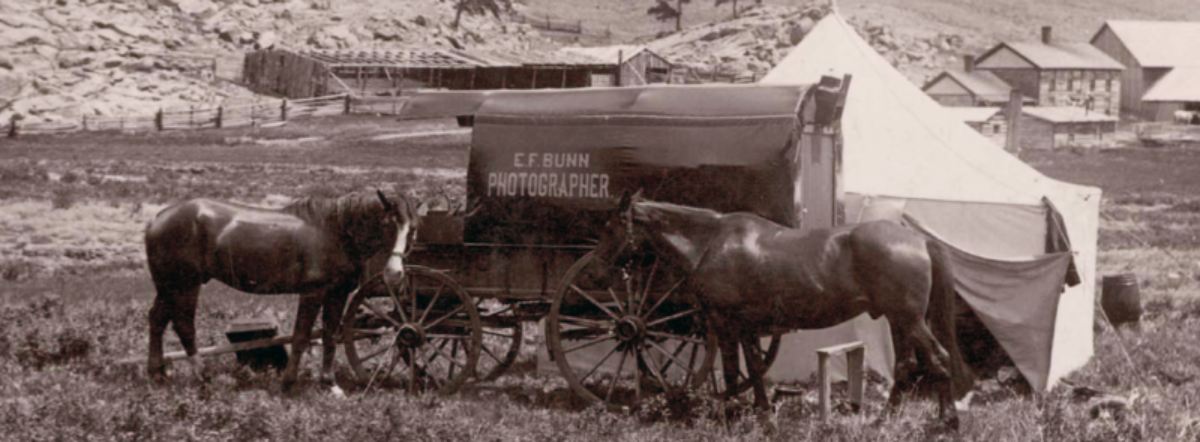
Last year at the Denver Post Card Show, I found a carte de visite of an unremarkable woman taken by Pierce from Greeley, Colorado. I checked my database of more than 1,200 Colorado photographers and noticed that Pierce was not on my list. My database is compiled chiefly from the seminal (but now outdated) book on Colorado photography, Colorado on Glass by Terry Wm. Mangan, 1975, Biographies of Western Photographers by Carl Mautz, 2018, and keyword searching the Colorado Historic Newspapers Collection database.
To find out more about Pierce, I began my research at the Hazel E. Johnson Research Center at the Greeley History Museum in Greeley, Colorado. Years ago, museum volunteers combed through their old newspaper collections and noted any mention of photographers working in the city. They prepared a card file arranged by photographers’ names, providing a goldmine for researchers, as the indexed newspapers have not been digitized.

In September 1883, E. W. Pierce arrived in Greeley to take charge of Benjamin F. Marsh’s gallery while Marsh traveled east to visit relatives. According to the April 23, 1884 Greeley Tribune, Pierce “began his artistic career in New York City, elaborated it in Chicago, polished it up in Denver…” He used the new instantaneous dry plate process that allowed Pierce to “take your head off in a second.” While he did not necessarily need sunlight for the exposure, he did need the sun for making the prints. Without it, the prints would be delayed. He was skilled in artistic lighting, retouching, and finishing.
Pierce stayed in Greeley after Marsh returned from his trip, even improving the studio by purchasing new photographic instruments from the east. During his stay, he claimed to have made nearly 10,000 negatives. This is probably an exaggeration, as Greeley’s population was only 1,500 in the mid-1880s. All negatives were numbered and booked, but neither the negatives nor the inventory are known to exist today. Pierce left Greeley in April 1884 for a viewing trip to Southern Colorado, Arizona and New Mexico.
In the summer of 1884, Marsh returned to Greeley with the goal of producing a souvenir view book of the city. The Tribune reported, “His plans[sic] is to make 12 or 24 negatives, and show proofs, and select 12 of the most interesting views, bind them in an elegant album cover, and supply them to subscribers at the low rate of $3.00 each, provided a sufficient number can be obtained.” By late August 1884, the accordian-style book had been produced, measuring roughly 5″ x 8″ consisting of nine photographs of Greeley. The book’s cover includes Pierce’s middle name, Warren, which should help identify the photographer, but only led to a dead end in my research.


Pierce remained off and on in Greeley until the fall of 1885. Then he went to California, running the Elite Studio in Los Angeles. His last studio was located in Santa Ana in 1887.
My theory is that E. W. Pierce is the same photographer who worked in Galena, Illinois in the 1860s and 1870s. His name was variously spelled as E. W. Peirce, E. W. Pierce, E. W. K. Pierce and Edward Woodbine Peirce.
Pierce was born circa 1836 in Troy, New York. As a teen, he in lived in Brooklyn, New York, where he father was a merchant. By 1864, Pierce was working as a photographer in Galena, Illinois. Before December 1, 1876, Pierce sold his gallery to John H. Pooley. Pierce then traveled around the Midwest setting up temporary galleries before acquiring the Railroad Palace Photographing Car. The coach measured fifty feet long, ten feet wide and eight feet high, containing a reception room and operating department. The car followed the line of the Illinois Central.
A brief mention in the March 15, 1880 issue of the Galena Daily Gazette provides a Colorado connection: “E. W. K. Pierce, the artist, has sold out his Des Moines establishment, and has started a general store in Gunnison City, Col.” He could have then resided in Greeley between 1883 and 1885, and then moved on to Los Angeles. Edward W. Pierce died on September 4, 1888 in California and is buried at Napa County’s Tulocay Cemetery.
What do you think of this theory?
Miranda Todd, Archives Assistant, City of Greeley Museums scanned the two images from the Greeley Museums and provided research assistance. Beverly W. Brannan, former curator of photography at the Library of Congress, Prints & Photographs Division, proofread this post.
